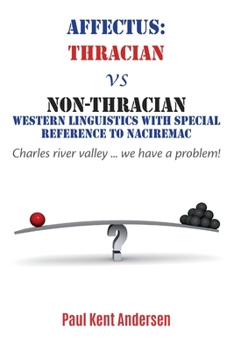Affectus: Thracian vs Non-Thracian Western Linguistics with special reference to Naciremac: Charles river valley ... we have a problem
This book presents an investigation of a central category in linguistics originally defined in the Classical Greek grammar ascribed to Dionysios Thrax. We will go step-by-step through the original definition taking into account what the Greek and Roman grammarians ("Thracians") wrote, much of which were commentaries to Thrax's original definition and further developments of the analysis of the original category. Furthermore, we will discuss the fact that those linguists coming after the Greek and Roman grammarians ("non-Thracians") did not understand this category and instead invented their own category. This was not, however, your typical invention: it was at odds not only with all we knew about Thracian linguistics, but also with basic scientific principles. It was based crucially on two axioms accepted as true without question or proof which in turn then served as premises for further reasoning and arguments. In order to get this invention to work, non-Thracians needed to throw the scientific method overboard and instead invent a new methodology for analyzing languages which later became a foundation stone and even guiding intuition for non-Thracian theories of grammar. One of the most important consequences of this amounted to turning the manner in which non-Thracians performed their analyses into exactly the opposite of that in Thracian linguistics. Instead of collecting data and then attempting to reach scientifically meaningful conclusions using the scientific method, as in Thracian linguistics and science in general, non-Thracians already start with the conclusion, i.e. their two axioms, and then attempt to find or even invent data that supports the conclusion, or they look for ways of interpreting the data, so it supports the conclusion. Taken together this renders non-Thracian linguistics a discipline quite distinct from Thracian linguistics in much the same way we find a distinction within mathematics between Euclidean and non-Euclidean geometry. Thus, an important purpose of this book is not so much to present a critical evaluation of the results reached after decades of intensive research by generations of non-Thracians as it is an evaluation of the adequacy of the methodology and argumentation used to reach these conclusions. Hence, this will furthermore question the adequacy of the non-Thracian enterprise as a whole. Since it is an undeniable fact that theoretical consideration of this particular category has quite naturally focused on English and since generations of non-Thracians have been investigating the category in English intensively for many decades, it is safe to assume that all resources in English have been depleted and all relevant data gleaned from the English language. We therefore had no other choice in the matter than to base most of our arguments on data collected from an entirely different kind of language altogether (Naciremac). When it comes to languages other than English, non-Thracians rely primarily on grammars and other second- and third-hand sources and hearsay for their information. We therefore complement this discussion with a preliminary investigation of the Classical Greek and Latin languages themselves, i.e. those languages for which the category was first established. The drastic difference between the results reached by generations of non-Thracians over many decades of intensive research and those reached in this preliminary investigation questions once again the adequacy of the non-Thracian enterprise.
Format:Paperback
Language:English
ISBN:B0863RQMND
ISBN13:9798622955129
Release Date:March 2020
Publisher:Independently Published
Length:400 Pages
Weight:1.17 lbs.
Dimensions:0.8" x 6.0" x 9.0"
Customer Reviews
0 rating





